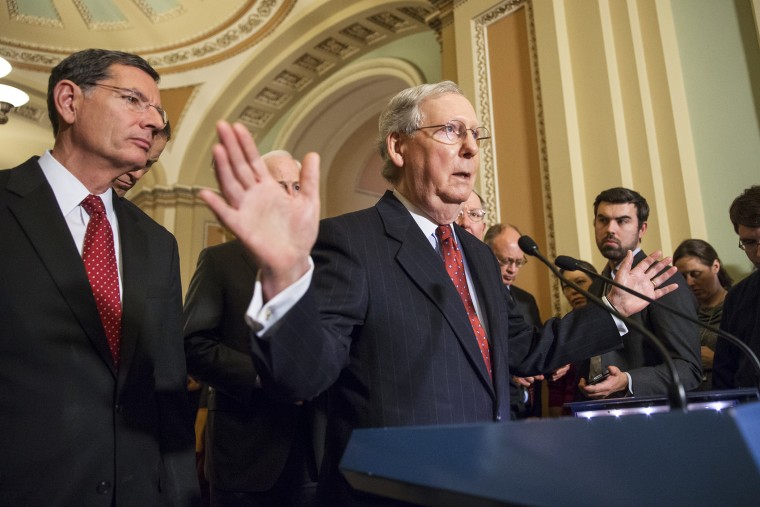After President Obama introduced Judge Merrick Garland for the Supreme Court, Republicans, some of whom called for Garland's nomination, said his qualifications were irrelevant. This is about the GOP's self-imposed, made-up principle regarding confirmation votes in a presidential election year, not the merits of the individual jurist.
Soon after, the Republican National Committee unveiled a list of complaints about Garland -- evidently representing the best RNC oppo researchers could come up with -- suggesting the Republicans had changed their mind about whether the fight was about the nature of the fight.
Over the weekend, in the party's official weekly address, Sen. Thom Tillis (R-N.C.) switched back to the original talking point, ignoring Garland and arguing, "This is about principle, not the person the president has nominated."
A day later, Senate Majority Leader Mitch McConnell (R-Ky.) switched again, saying it is about the person the president nominated. The GOP leader said on "Meet the Press" yesterday:
"I think when you've got a nominee that MoveOn.org is extremely enthusiastic about, and multiple articles pointing out that if Judge Merrick were in fact confirmed, he would move the court dramatically to the left.... I don't think it's a good idea to move the court to the left."
Soon after, McConnell quickly switched back, adding, "It's not the person. It's the principle."
On "Fox News Sunday," McConnell then contradicted his argument -- the second one, not the first one -- saying the fight is about the person. "I can't imagine that a Republican majority in the United States Senate would want to confirm in a lame duck session a nominee opposed by the National Rifle Association, the National Federation of Independent Business that represents small businesses that have never taken a position on the Supreme Court appointment before. They're opposed to this guy," McConnell said.
In the same interview, McConnell then contradicted this argument -- the first one, not the second one -- saying this isn't about Garland at all. "I think what we need to focus on is the principle, the principle," he argued. "Who ought to make this appointment?"
Part of the problem here is the cringe-worthy incoherence of the Republican pitch. Over the course of literally a few days, the party, which had a month to prepare for this showdown, has managed to tell the public the fight is about Garland, is not about Garland, except when it is, which it isn't. McConnell failed to keep his own story straight to a dizzying degree: the Kentucky lawmaker ended up changing his mind about his own argument several times just yesterday morning, taking both sides of the same issue within the same interview.
It's tempting to have Senate Republicans debate themselves for a while. Perhaps they can let the rest of us know when they've figured out what they want to say.
The more alarming problem is the fact that the Senate Majority Leader seems to think press releases from activist groups should have some direct role in shaping the future of the nation's highest court.
The constitutional process directs the Senate -- the institution formerly known as the world's most deliberative body -- to advise and consent in the confirmation process. As far as Mitch McConnell is concerned, however, senators shouldn't even consider a qualified nominee because MoveOn.org and the National Rifle Association have provided the Senate Majority Leader with all of the information he needs to know.
Who needs the Senate Judiciary Committee to hold confirmation hearings about one of the nation's most important jobs? Mitch McConnell has a press statement from a lobbying group -- and in 2016, the NRA and the National Federation of Independent Business apparently have veto power over the nominations to the nation's highest court.
If McConnell is still capable of shame, now would be an excellent time for him to recognize just how sad a display he's putting on for the nation.
